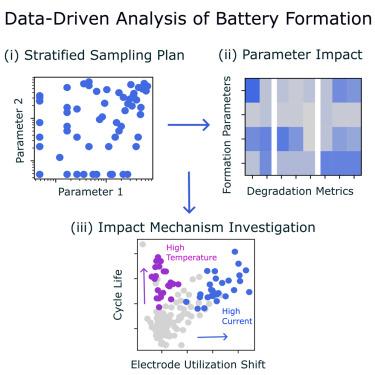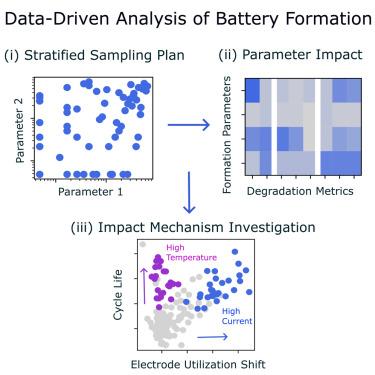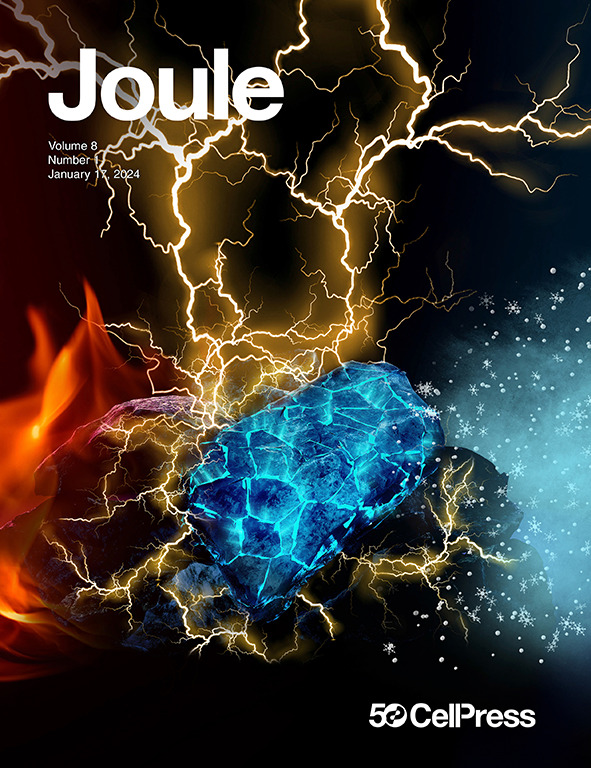对电池化成的数据驱动分析揭示了电极利用在延长循环寿命中的作用
IF 38.6
1区 材料科学
Q1 CHEMISTRY, PHYSICAL
引用次数: 0
摘要
形成是电池制造的关键步骤。在此过程中,锂库存被消耗以形成固态电解质间相(SEI),这反过来又决定了电池的使用寿命。为了应对庞大的参数空间和复杂的化成过程,我们采用了数据驱动工作流程,对 186 个锂离子电池单元进行了 62 种化成协议的分析。我们确定了两个关键参数:化成充电电流和温度,它们通过不同的机制控制电池的寿命。令人惊讶的是,第一个循环的高化成充电电流可将电池循环寿命平均延长 50%。化成温度的升高可通过形成稳固的 SEI 来提高电池性能,而快速化成电池则不同,其循环寿命的提高源于化成后电极利用率的改变。除了公认的化成对 SEI 性能的影响外,我们还展示了化成协议如何决定正负极循环的化学计量范围。本文章由计算机程序翻译,如有差异,请以英文原文为准。


Data-driven analysis of battery formation reveals the role of electrode utilization in extending cycle life
Formation is a critical step in battery manufacturing. During this process, lithium inventory is consumed to form the solid electrolyte interphase (SEI), which in turn determines the battery lifetime. To tackle the vast parameter space and complexity of formation, we employ a data-driven workflow on 186 lithium-ion battery cells across 62 formation protocols. We identify two key parameters, formation charge current and temperature, that control battery longevity via distinct mechanisms. Surprisingly, high-formation charge current on the first cycle extends battery cycle life by an average of 50%. Unlike elevated formation temperature, which boosts battery performance by forming a robust SEI, the cycle life improvement for fast-formed cells arises from a shifted electrode-specific utilization after formation. Apart from the widely acknowledged role of formation in governing SEI properties, we demonstrate how formation protocols determine the stoichiometry range over which the positive and negative electrodes are cycled.
求助全文
通过发布文献求助,成功后即可免费获取论文全文。
去求助
来源期刊

Joule
Energy-General Energy
CiteScore
53.10
自引率
2.00%
发文量
198
期刊介绍:
Joule is a sister journal to Cell that focuses on research, analysis, and ideas related to sustainable energy. It aims to address the global challenge of the need for more sustainable energy solutions. Joule is a forward-looking journal that bridges disciplines and scales of energy research. It connects researchers and analysts working on scientific, technical, economic, policy, and social challenges related to sustainable energy. The journal covers a wide range of energy research, from fundamental laboratory studies on energy conversion and storage to global-level analysis. Joule aims to highlight and amplify the implications, challenges, and opportunities of novel energy research for different groups in the field.
 求助内容:
求助内容: 应助结果提醒方式:
应助结果提醒方式:


